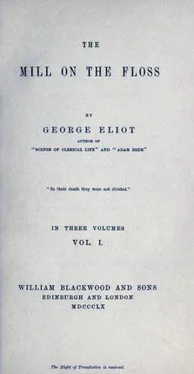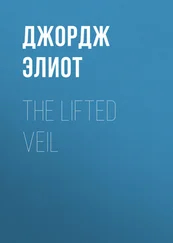And they went. Maggie felt that she was being led down the garden among the roses, being helped with firm, tender care into the boat, having the cushion and cloak arranged for her feet, and her parasol opened for her (which she had forgotten), all by this stronger presence that seemed to bear her along without any act of her own will, like the added self which comes with the sudden exalting influence of a strong tonic, and she felt nothing else. Memory was excluded.
They glided rapidly along, Stephen rowing, helped by the backward-flowing tide, past the Tofton trees and houses; on between the silent sunny fields and pastures, which seemed filled with a natural joy that had no reproach for theirs. The breath of the young, unwearied day, the delicious rhythmic dip of the oars, the fragmentary song of a passing bird heard now and then, as if it were only the overflowing of brimful gladness, the sweet solitude of a twofold consciousness that was mingled into one by that grave, untiring gaze which need not be averted, — what else could there be in their minds for the first hour? Some low, subdued, languid exclamation of love came from Stephen from time to time, as he went on rowing idly, half automatically; otherwise they spoke no word; for what could words have been but an inlet to thought? and thought did not belong to that enchanted haze in which they were enveloped, — it belonged to the past and the future that lay outside the haze. Maggie was only dimly conscious of the banks, as they passed them, and dwelt with no recognition on the villages; she knew there were several to be passed before they reached Luckreth, where they always stopped and left the boat. At all times she was so liable to fits of absence, that she was likely enough to let her waymarks pass unnoticed.
But at last Stephen, who had been rowing more and more idly, ceased to row, laid down the oars, folded his arms, and looked down on the water as if watching the pace at which the boat glided without his help. This sudden change roused Maggie. She looked at the far-stretching fields, at the banks close by, and felt that they were entirely strange to her. A terrible alarm took possession of her.
"Oh, have we passed Luckreth, where we were to stop?" she exclaimed, looking back to see if the place were out of sight. No village was to be seen. She turned around again, with a look of distressed questioning at Stephen.
He went on watching the water, and said, in a strange, dreamy, absent tone, "Yes, a long way."
"Oh, what shall I do?" cried Maggie, in an agony. "We shall not get home for hours, and Lucy? O God, help me!"
She clasped her hands and broke into a sob, like a frightened child; she thought of nothing but of meeting Lucy, and seeing her look of pained surprise and doubt, perhaps of just upbraiding.
Stephen moved and sat near her, and gently drew down the clasped hands.
"Maggie," he said, in a deep tone of slow decision, "let us never go home again, till no one can part us, — till we are married."
The unusual tone, the startling words, arrested Maggie's sob, and she sat quite still, wondering; as if Stephen might have seen some possibilities that would alter everything, and annul the wretched facts.
"See, Maggie, how everything has come without our seeking, — in spite of all our efforts. We never thought of being alone together again; it has all been done by others. See how the tide is carrying us out, away from all those unnatural bonds that we have been trying to make faster round us, and trying in vain. It will carry us on to Torby, and we can land there, and get some carriage, and hurry on to York and then to Scotland, — and never pause a moment till we are bound to each other, so that only death can part us. It is the only right thing, dearest; it is the only way of escaping from this wretched entanglement. Everything has concurred to point it out to us. We have contrived nothing, we have thought of nothing ourselves."
Stephen spoke with deep, earnest pleading. Maggie listened, passing from her startled wonderment to the yearning after that belief that the tide was doing it all, that she might glide along with the swift, silent stream, and not struggle any more. But across that stealing influence came the terrible shadow of past thoughts; and the sudden horror lest now, at last, the moment of fatal intoxication was close upon her, called up feelings of angry resistance toward Stephen.
"Let me go!" she said, in an agitated tone, flashing an indignant look at him, and trying to get her hands free. "You have wanted to deprive me of any choice. You knew we were come too far; you have dared to take advantage of my thoughtlessness. It is unmanly to bring me into such a position."
Stung by this reproach, he released her hands, moved back to his former place, and folded his arms, in a sort of desperation at the difficulty Maggie's words had made present to him. If she would not consent to go on, he must curse himself for the embarrassment he had led her into. But the reproach was the unendurable thing; the one thing worse than parting with her was, that she should feel he had acted unworthily toward her. At last he said, in a tone of suppressed rage,–
"I didn't notice that we had passed Luckreth till we had got to the next village; and then it came into my mind that we would go on. I can't justify it; I ought to have told you. It is enough to make you hate me, since you don't love me well enough to make everything else indifferent to you, as I do you. Shall I stop the boat and try to get you out here? I'll tell Lucy that I was mad, and that you hate me; and you shall be clear of me forever. No one can blame you, because I have behaved unpardonably to you."
Maggie was paralyzed; it was easier to resist Stephen's pleading than this picture he had called up of himself suffering while she was vindicated; easier even to turn away from his look of tenderness than from this look of angry misery, that seemed to place her in selfish isolation from him. He had called up a state of feeling in which the reasons which had acted on her conscience seemed to be transmitted into mere self-regard. The indignant fire in her eyes was quenched, and she began to look at him with timid distress. She had reproached him for being hurried into irrevocable trespass, — she, who had been so weak herself.
"As if I shouldn't feel what happened to you — just the same," she said, with reproach of another kind, — the reproach of love, asking for more trust. This yielding to the idea of Stephen's suffering was more fatal than the other yielding, because it was less distinguishable from that sense of others' claims which was the moral basis of her resistance.
He felt all the relenting in her look and tone; it was heaven opening again. He moved to her side, and took her hand, leaning his elbow on the back of the boat, and saying nothing. He dreaded to utter another word, he dreaded to make another movement, that might provoke another reproach or denial from her. Life hung on her consent; everything else was hopeless, confused, sickening misery. They glided along in this way, both resting in that silence as in a haven, both dreading lest their feelings should be divided again, — till they became aware that the clouds had gathered, and that the slightest perceptible freshening of the breeze was growing and growing, so that the whole character of the day was altered.
"You will be chill, Maggie, in this thin dress. Let me raise the cloak over your shoulders. Get up an instant, dearest."
Maggie obeyed; there was an unspeakable charm in being told what to do, and having everything decided for her. She sat down again covered with the cloak, and Stephen took to his oars again, making haste; for they must try to get to Torby as fast as they could. Maggie was hardly conscious of having said or done anything decisive. All yielding is attended with a less vivid consciousness than resistance; it is the partial sleep of thought; it is the submergence of our own personality by another. Every influence tended to lull her into acquiescence. That dreamy gliding in the boat which had lasted for four hours, and had brought some weariness and exhaustion; the recoil of her fatigued sensations from the impracticable difficulty of getting out of the boat at this unknown distance from home, and walking for long miles, — all helped to bring her into more complete subjection to that strong, mysterious charm which made a last parting from Stephen seem the death of all joy, and made the thought of wounding him like the first touch of the torturing iron before which resolution shrank. And then there was the present happiness of being with him, which was enough to absorb all her languid energy.
Читать дальше












